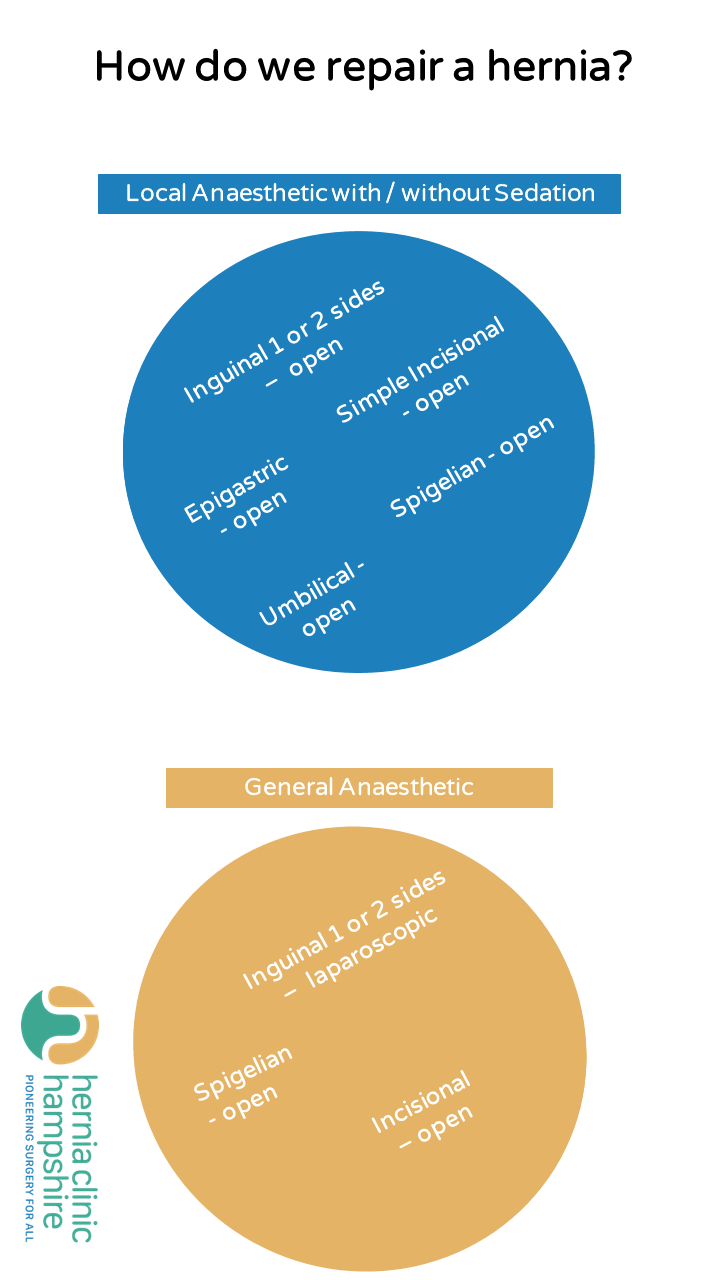How To Repair a Hernia
Did you know there is more than one way to repair a hernia? Different patients, different types of hernia, and different hernia sizes result in different approaches to hernia repair. At Hernia Clinic Hampshire we provide treatment tailored for you. Our skilled Consultant Surgeon will work with you to discuss your needs to help you understand how best to repair your hernia, and to give you the ability to make an informed decision on your personalised hernia surgery and recovery plan.
We have extensive experience with patients who come with concerns.
Have you been told general anaesthesia is high risk for you, or are you nervous of anaesthetic? We can help you avoid general anaesthesia through our innovative use of local anaesthesia for hernia surgery.
Do you have two hernias? We are experts in bilateral hernia surgery and can repair a hernia on each side at the same time or with a two-staged approach.
Are you worried about the scar that will be left behind? We work with you to help you better understand the wound healing process and what you can do so that you have a comfortable, pliant scar.
Maybe you simply want a say in how your hernia is repaired. At Hernia Clinic Hampshire, we give you that choice, as well as the information needed to make it.
How Do You Repair a Hernia?
At Hernia Clinic Hampshire, we are experts in how to repair a hernia, including both open and laparoscopic hernia approaches.
We often recommend an open hernia repair using our innovative approach of local anaesthetic and sedation. Perfected by our Consultant Surgeon, this approach is gentle on the body and accessible to all, including those who cannot have a general anaesthetic.
However, for some people we recommend a laparoscopic repair using a general anaesthetic instead. Both approaches use a synthetic mesh, which lowers the risk of recurrence and long-term pain.
Read more about hernia meshes here
Whatever your situation, we at Hernia Clinic Hampshire, want to help you understand the different ways we can repair your hernia and give you peace of mind about your recovery.
During your consultation, our highly experienced Consultant Surgeon will discuss your personal needs and options and guide you to an informed decision on your personalised hernia surgery plan.
How To Repair a Hernia: General Anaesthetic vs. Local Anaesthetic and Sedation
Most hernia types are suitable for open surgery under local anaesthetic and sedation. This includes one-sided groin, umbilical, epigastric and smaller incisional hernias, whether it is your first or a reoccurring hernia.
Find out more about local anaesthesia and sedation for open hernia surgery
Particularly large hernias may need a general anaesthetic. Laparoscopic hernia repairs can only be performed under general anaesthetic and may be preferable if, for example, you have two hernias you want to repair at the same time.
Laparoscopic repairs are suitable for Bilateral or recurrent hernia repairs.
Read more about when we might recommend laparoscopic hernia surgery under general anaesthesia
Make sure you also read about the different ways we lower the risk of recurrence
What do our patients have to say about their experiences with the different approaches?
The initial consultation confirmed to me that Mr Kirkby-Bott was an expert in his field. His explanation of the options and the proposed course of action were very clearly explained without my ever feeling that I was under pressure to agree to what he was proposing.
I had an initial appointment within days of first contacting them and had my op 2 weeks after. I had a full discussion with Mr Kirkby-Bott before, he clearly explained the treatment options and allayed worries I had about use of mesh.
The care at the hospital was excellent and I was kept fully informed and supported throughout. The recovery process was explained, I had no complications and I had a useful follow up appointment with the surgeon Mr, Kirkby-Bott.

